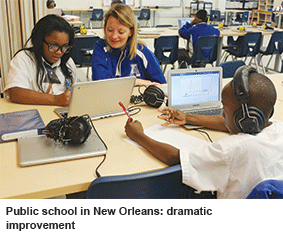 In theory, it works perfectly. Rather than oblige parents to send their children to the nearest state-run or funded school, give them a voucher to be spent at a private school of their choice. “The adoption of such arrangements,” argued Milton Friedman way back in 1955, “would make for more effective competition among various types of schools and for a more efficient utilisation of their resources.”
In theory, it works perfectly. Rather than oblige parents to send their children to the nearest state-run or funded school, give them a voucher to be spent at a private school of their choice. “The adoption of such arrangements,” argued Milton Friedman way back in 1955, “would make for more effective competition among various types of schools and for a more efficient utilisation of their resources.”
As part of its recovery from Hurricane Katrina (2005), which destroyed many schools in New Orleans, Louisiana undertook one of America’s largest school-choice schemes. But according to a new research study School Vouchers and Student Achievement: First-year Evidence from the Louisiana Scholarship Programme by Atila Abdulkadiroglu of Duke University, Parag Pathak of MIT and Christopher Walters of Berkeley, it has not gone well.
Louisiana’s scheme, brought in by a conservative governor, added a feature that ought to delight progressives: a lottery to assign the vouchers. In 2014, 12,000 students from low-income families applied for more than 6,000 vouchers to attend 126 private schools. Lotteries are loved by social scientists because the winners and losers, distinguished by chance alone, are statistically identical. That means differences in learning outcomes can reasonably be attributed to the programme rather than, say, differences in family circumstances.
It turned out this was a lottery to lose. The three economists discovered that those who received vouchers and moved to private schools had worse test scores in maths, reading, science and social studies than those who missed out.
Schools in New Orleans have improved dramatically since Hurricane Katrina: high-school-graduation rates have risen from 55 to 73 percent and drop-out rates have fallen by half. But this has been a victory for central control rather than the market: bureaucrats at the state’s powerful Recovery School District have closed many schools and presided over the opening of many more. More parental school choice seems to have had little to do with it.